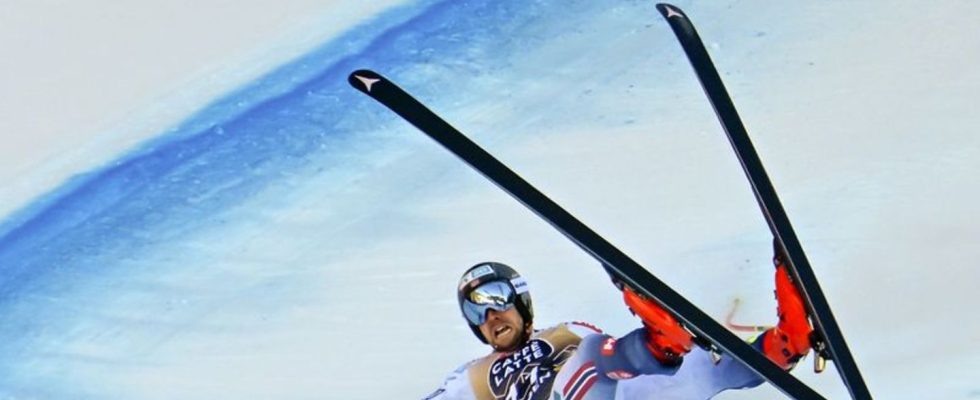Alpine skiing
Kilde crash causes debate in Kitzbühel
Crashed badly in Wengen: Aleksander Aamodt Kilde from Norway. photo
© Peter Schneider/KEYSTONE/dpa
The best downhill skier falls violently – fortunately, his worst fears are not confirmed. Nevertheless, a security debate has broken out in front of Kitzbühel. A German coach becomes clear.
With bloody scratches on his nose, chin and lip, Aleksander Aamodt Kilde smiles somewhat crookedly into the cell phone camera Girlfriend Mikaela Shiffrin. The ski racer lies in a hospital bed in Bern, a small tube supplies the Norwegian with oxygen through his nose.
Post on X
The selfie snapshot lets the ski world breathe a cautious sigh of relief after it was shocked by Kilde’s fall during Saturday’s descent in Wengen. Just before the weekend on the dreaded Streif in Kitzbühel, a safety debate has broken out again. The target of the criticism is the world association Fis.
Pool of blood in the snow
But first things first: Kilde escaped his accident shortly before the finish more lightly than feared. The 31-year-old suffered a cut in his calf and dislocated his shoulder, the Norwegian association announced. The athlete has already undergone surgery. “He has no fractures, but is injured,” said Norwegian team doctor Marc Jacob Strauss.
The pictures from Saturday had given rise to fears of the worst: Kilde had not caught the last swing before the finish and had crashed into the safety net at high speed. He stayed there and was treated.
A small pool of blood formed in the snow and a medic clamped the athlete’s right thigh with a band, as could be seen on television. Rumors about an open fracture of the lower leg were circulating – but were not confirmed. Kilde was winched into a rescue helicopter and flown away.
“I hope it’s a lesson”
“I’m patched up,” he wrote to the Norwegian on Instagram about the selfie with his girlfriend Shiffrin. The best ski racer in the world did not compete in any races at the weekend and rushed to Kilde in Bern. “I’m grateful for all the words of love and support. This sport can be brutal, but I still love it.”
The accident also caused horror because it affected Kilde, the dominator of downhill skiing in recent years. He in particular was not expected to have any problems on the difficult and exhausting Lauberhorn descent in Wengen – even if his health was a little poor.
“I hope that it’s a lesson never to drive three races here again,” said winner Marco Odermatt at the finish, as could be heard on the TV broadcast. The speed weekend began on Thursday with a catch-up descent from Beaver Creek, followed on Friday by the Super-G and then on Saturday by the classic Lauberhorn race, the longest descent in the entire World Cup.
Second-placed Cyprien Sarrazin from France found the current workload “no longer normal.” Race director Markus Waldner has already announced that he will forego such XXL stations in the future. “That was too much,” said Waldner and emphasized: “It’s not good to force something into an already overloaded calendar.”
Criticism from the German head coach: “Insanity”
The German downhill skiers disappointed again, Andreas Sander only came 28th as the best DSV athlete. On a day like this, however, extenuating circumstances can be cited – Sander, for example, was flagged off during his ride because the previous rider fell and had to start again.
“The program we are currently running is crazy,” said German head coach Christian Schwaiger. He is struggling with the racing calendar this year, which demands an extremely large number of competitions from the athletes in a short period of time. “The problem starts with the basic calendar planning. And unfortunately it’s not the experts who do it, but others.”
“If we overload the weekends with races, we are inviting really bad things to happen,” warned Schwaiger in an interview with the German Press Agency. The young Austrian Gernot Reinstadler had a fatal accident at Kilde’s accident site in 1992 – back then, of course, the safety measures were less sophisticated than they are today.
Many injuries mar the ski winter
But the winter of 2023/24 has already seen many falls. In Bormio at the end of December, the Austrian Marco Schwarz fell and seriously injured his knee. On Friday in Wengen, Frenchman Alexis Pinturault also suffered a torn cruciate ligament and, like Schwarz, will be out for months. And now Kilde. “We have now lost three superstars in three races,” reminded coach Schwaiger. The anticipation for Kitzbühel in the new week is clouded.
He has the greatest respect for Odermatt and Sarrazin, who outclassed the competition on Saturday, “amazing, an incredible performance,” said Schwaiger. “But the sport lost today.”

